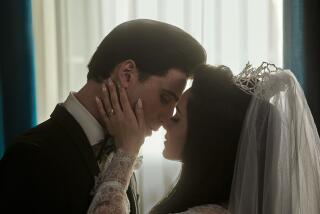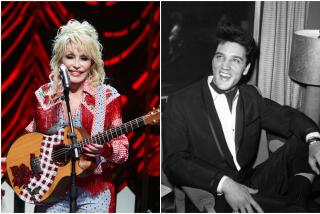TV REVIEWS : ‘Elvis & the Colonel’: Return to Sender
- Share via
Telling the story of Elvis Presley from the point of view of his universally reviled manager, Col. Tom Parker, is a little like one of those weird theatrical attempts to tell the story of Jesus through Judas Iscariot--an audaciously ambitious idea, but not one for amateurs.
Unfortunately, the TV movie “Elvis & the Colonel: The Untold Story” (at 9 p.m. Sunday on NBC, Channels 4, 36 and 39) hasn’t the slightest interesting take on what it means for an artist to give a pound of flesh over to an untrustworthy business confidant.
In fact, the only meager reason to tune in is the usual campy one: to be a perverse voyeur to poor Elvis getting bloated . . . speaking of pounds of flesh.
Despite insisting in interviews that “these two loved each other,” Beau Bridges plays the Colonel as an unremittingly reprehensible bird of prey, without a redeeming bone in his body--from the tip of his unsightly comb-over to the bottom of his bad leg. Newcomer Rob Youngblood--who bears little resemblance to his subject in any way--does Elvis as a naive, almost spineless hick who occasionally gets a vision beyond the thick veil of bad taste and bad business deals imposed by his manager.
The filmmakers seem to know they have a major problem with this structure, so they’ve imposed a flashback narration in which--get this-- Elvis reminisces from beyond the grave about how he got hoodwinked and didn’t recognize the Colonel’s duplicity “until it was too late” (as in, presumably, daisy-pushing time). He looks at the camera with, well, dead earnestness and says things like “So now I bet you’re wondering how I ended up in Vegas, right?”
Oh, in case you’re wondering, the dead Elvis is the young, thin Elvis. Whew.
This “Sunset Boulevard” / “Wired”-style narration is indeed a hoot, but the rest is hard to watch--an unsavory story ripe with genuine pathos but so cartoonishly realized it’s pathetic in too many ways both intentional and unintentional to bear. One of the filmmakers is director William A. Graham, who directed the real Elvis in the 1969 “Change of Habit,” but whose closeness to the subject yields no rewards in this drama.
“The only one I shoulda trusted was my mama,” dead Elvis declares at one point, watching his old self on TV. He can include the cynics behind “Elvis and the Colonel” in the untrustworthy camp. Fans can take comfort in the fact that, unlike the ghostly dullard portrayed here, if Elvis really is in heaven watching this foolishness, he’s shooting out his celestial TV right now.
More to Read
The complete guide to home viewing
Get Screen Gab for everything about the TV shows and streaming movies everyone’s talking about.
You may occasionally receive promotional content from the Los Angeles Times.






